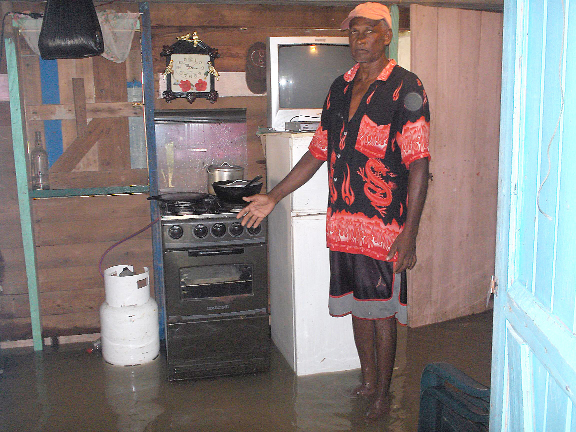– residents lose poultry, crops
In the wee hours of yesterday morning, several residents of the West Bank Demerara Village of Vive la Force were forced to abandon sleep and attempt to save their poultry, household appliances and other items, after heavy rain caused severe flooding in their yards and bottom flats of their houses.
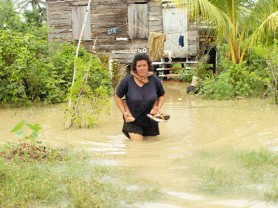
The heavy overnight downpour caused several villages along the West Bank Demerara to become inundated but the community of Vive la Force was easily one of the worst hit.
When this newspaper visited the community yesterday around 11:00 hrs, Barbara Thornhill was wading through almost waist-high water with one of her three children on her back. The mother of three said she had been living in the area for eight years and said this was one of her worst experiences in an area which is prone to flooding. “But the water gone down,” she said, “it was worse this morning before they open the koker.” Her main concern appeared to be getting the water off the land quickly.
The community consists predominantly of workers from the Wales Sugar Estate who supplement their income by engaging in poultry and crop farming. Now, many of the farmers are contemplating their next move since much of their poultry would have died and their crops destroyed because of yesterday’s occurrence. They said that persistent downpours earlier had led to sections of the community being under water but during the night the situation took a turn for the worse when a heavy downpour saw the accumulated water rise rapidly. For many this brought back memories of the 2005 Great Flood.
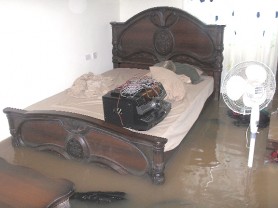
One outspoken resident Ramchandra Mohan said his poultry business has been severely affected. Unlike many of the other residents in the community, Mohan depends solely on farming for his livelihood. “Me lose 1,200 baby chickens,” he said, as he pointed out that he had a wife and four children to support. He is already contemplating going overseas for a few months to try to “ketch meh hand” and to try to support his family.
He was very critical of the administration for not doing enough to curb the problem which he said was stunting the community’s development. “The place can’t develop like this,” he said repeatedly to this newspaper.
Meanwhile, he was very concerned about possible health hazards, since he noted that many of the residents still use latrines. He called for the Health Minister to visit the community and render the necessary assistance especially to families with little children.
Mohammed Ally was another resident who has been badly affected. He shares a home with four daughters and his mother Bibi Katima. Yesterday their entire bottom flat was filled with inches of water, forcing the family to lift several of the appliances to higher ground. Katima expressed concerns about the health of her family, since she said that the home’s septic tank had overflowed.
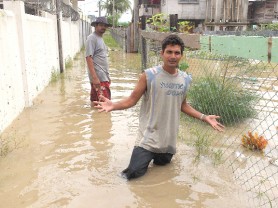
Rudolph Mangal operates a shop in the area, in addition to doing poultry farming. Water not only flooded his home, but his business place damaging a substantial amount of his stock. He said too that all 25 of the ducks he reared had died.
Another farmer, Asraf Persaud, said that he had managed to rescue 40 of his 80 chickens. He told this newspaper that the surviving chickens were being kept in his house since there was simply no other place to keep them. He recounted waking up at 3 am, to rescue the chickens, after he realized that they were in danger.
Several cash crop farmers in the community told this newspaper that they had lost all their produce, which they explained was integral to their income. One resident Rama Ramlochan said he had lost almost $40,000 in crops. He had planted carilla, saeme and squash.
Residents said that whenever there is heavy rainfall, the water would run off from the cane fields into their low-lying village. A canal separates the village from the cane fields. To counteract this problem, some suggested, the main access road to the village needed to be raised.
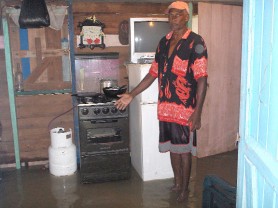
The residents said too that the dam leading to the sluice which drains the community is too low and consequently there is frequent overtopping. They also identified silted drains as a problem, even as they called for an additional pump to be supplied to the area.
When contacted yesterday, Region Three Chairman Julius Faeber acknowledged that flooding was an issue in the community. He said that there was not much that could be done to alleviate the problem as long as the heavy rainfall persisted, which would prevent all the water from being pulled off the land. The village, he said, would suffer because of its proximity to the cane fields and because of how the drainage system was interconnected.
Regarding the dam, Faeber said that heavy-duty vehicles usually traverse it daily and this would cause some damage.
While noting that some of these vehicles were attached to the Wales Sugar Estate, he explained that many of the heavy-duty vehicles that usually traverse the area are used by farmers in the village. He said that while the regional authorities would render assistance, the affected farmers were part of a Cane Farming Society and could do more to help themselves.
“They have to help themselves… our allocation cannot do everything,” he said.
Faeber said too that the Regional Council has done work on the road in the community over the last five years and this included efforts to upgrade it. He also said that efforts had been made to desilt the canals in the area.

